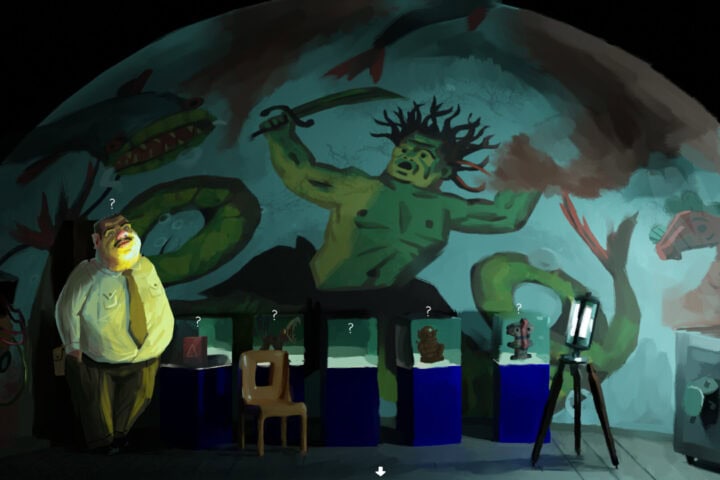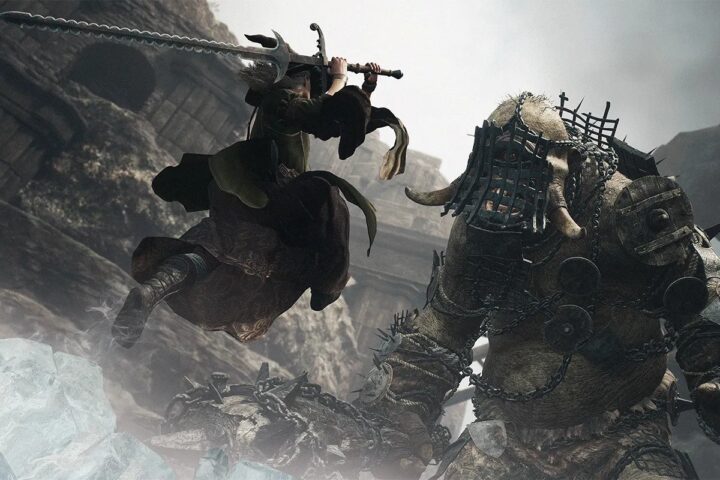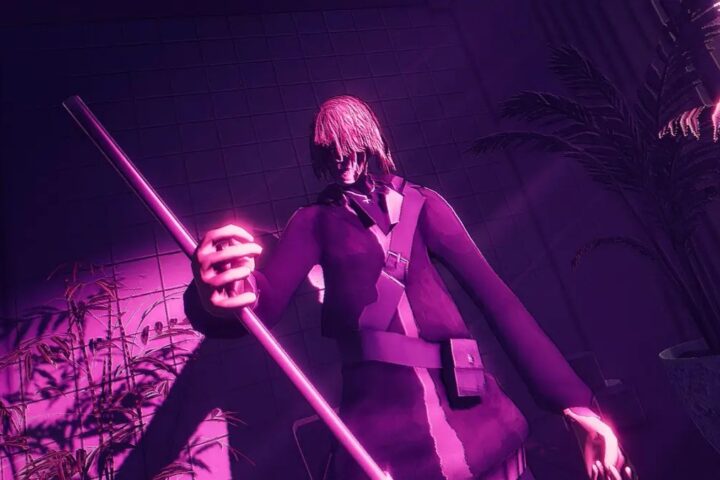One glance at Harold Halibut’s eye-catching stop-motion aesthetics is enough to sell you on the vibe of this peculiar adventure game. But though it walks and talks with the swagger of Wes Anderson’s Fantastic Mr. Fox, the decision from developers Slow Bros. to tell this story in an interactive medium is a deadly one. Harold Halibut dabbles in many things—Kafkaesque scenarios, capitalist critiques, alien philosophies—but the one thing it intentionally eschews are puzzles. And the result is a frictionless walking simulator.
It’s no accident that Harold Halibut begins on Day 18250 A.C. (after crash) with your eponymous character being hauled into the All Water offices by the local constable. Harold is drowning in the rules and regulations of the shipwrecked and submerged FEDORA (Federation of Residents in Airspace), and every day is much the same tedious slog as the last. “Only boring people get bored,” scolds Harold’s kindly mentor, Professor Mareaux, putting that to the test over the next several hours of numbing fetch quests that she sends you on.
If only this tedious slow burn were in the service of communicating something unexpected. Instead, it at best abruptly reveals—in an impromptu mop-and-bucket song-and-dance that Harold performs while once again cleaning the ship’s filters thinking nobody is watching—that he longs for more from life. That’s all well and good, but when Harold gets his life-changing wish and not only makes first contact with an alien species but becomes best friends with it, Harold Halibut itself remains as devastatingly dull to play as it is curious to watch.
Whether aboard the FEDORA or exploring an alien cave network, players can only ever walk and talk. Despite Harold’s increasing involvement with the ship’s scientists, he’s not expected to do any intellectual heavy lifting. In fact, the rare moments of actual gameplay are little more than prompts to push a clearly marked button. The game is devoid of challenge, and at the first sign that Harold might have to actually do something, other characters rush to the rescue.
If anything, the game is at times almost comically anti-puzzle, with its most interactive segment hinging on a joy-buzzer-like prank. And while you can endlessly crash a spaceship in the hard-as-nails flying game located in the station’s arcade, when you actually sit behind the controls of a submarine, it switches over to autopilot. Things constantly happen around Harold, not because of him, and you’ll find that the vast majority of Harold Halibut consists of randomly traveling across the station in the hopes of triggering an optional scene or two.
Even when Harold is hallucinatorily chasing a dragon or attempting to stop a science experiment gone wrong, the mechanics behind that narrative remain resolutely uninteresting. The game’s cinematic aspirations worsen this effect, because they heighten the distance between what you’re meant to be feeling and what you’re actively doing. In one climactic sequence, Harold makes a slow-motion exit in which he’s meant to be reconsidering every choice that’s brought him to this point, while BADBADNOTGOOD’s “Time Moves Slow” plays stylishly in tempo with his gait. That’d probably look cool in a movie, but it’s decidedly less fun to engage with the scene by holding down the forward direction button for the track’s four-plus minutes.
There’s a dissonance here, because Harold Halibut itself isn’t boring. The dioramic and claustrophobic spaces of the FEDORA and their strikingly alien counterparts in the Flumylyn Caves are bustling with activity and color, and you may find yourself idling in the Agora Arcade to watch a self-proclaimed performance artist wordlessly re-enact a book from long-lost Earth, or to hear the slam poetry of an anarcho-syndicate student outside the Social District’s school. Despite the game’s nonsensical approach to a mail-delivery subquest (you can only carry one letter at a time), the payoff of getting to see and hear the handwritten messages read aloud does indeed evoke what Buddy, the post clerk, describes as “exploring tiny little worlds.”
Sadly, as your companion Weeoo puts it, “‘Having’ a fish is not the same as ‘getting’ a fish.” Ultimately, Harold Halibut’s abundance of charm doesn’t translate to the game being charming, and in the end, while there’s plenty to see here, there’s just nothing to do.
This game was reviewed with code provided by popagenda.
Since 2001, we've brought you uncompromising, candid takes on the world of film, music, television, video games, theater, and more. Independently owned and operated publications like Slant have been hit hard in recent years, but we’re committed to keeping our content free and accessible—meaning no paywalls or fees.
If you like what we do, please consider subscribing to our Patreon or making a donation.





